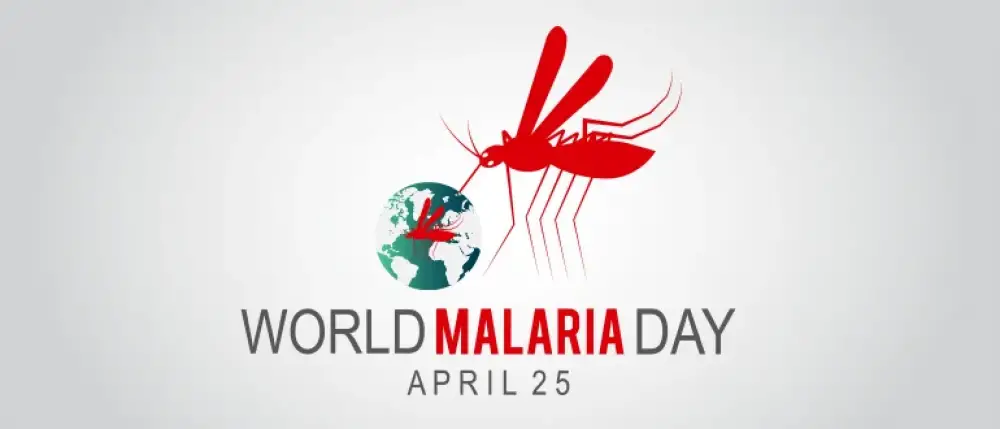Malaria is a life-threatening disease. Since the late 1990s, global efforts have prevented 2.2 billion malaria cases and 12.7 million deaths. In 2022, India reported a 30% decline in malaria cases, with 33.8 lakh cases nationwide. With the rising awareness and infrastructural development, the cases are declining.
But now, the progress has stalled after years of decline. Now, malaria kills about one person every minute, making it a grave and urgent concern worldwide. We observe World Malaria Day each year on the 25th of April as a step towards preventing and controlling malaria cases.
The World Health Organisation pays utmost importance to suppressing the spread of malaria. This article will discuss Malaria Awareness Day, various causes and symptoms of malaria, and possible medical treatments. So, let's continue.
Why is World Malaria Day Celebrated?
World Malaria Day was first recognised globally in 2007 and celebrated for the first time internationally in 2008. The 25th of April, as World Malaria Day, was influenced by Africa Malaria Day, which has been held by the African government on this date since 2001.
World Malaria Day is held globally and acknowledged to increase awareness of this disease. The larger and long-term goal is to make our world malaria-free, so there is no more loss of life due to this illness. The World Health Organisation believes that malaria is a preventable disease. With proper precautionary measures, increased awareness, and better healthcare facilities, it is possible to stop malaria deaths and serious cases. Every year, India also steps towards eliminating malaria on World Malaria Day, aiming to eliminate it by 2030.
World Malaria Day 2025 Theme
Like always, World Malaria Day will be held on 25 April 2025. This year's theme is Reinvest, Reimagine, and Reignite. It calls for renewed commitment, fresh ideas, and continued investment in malaria control. With new technologies improving early detection, especially in remote areas, this theme underscores the importance of innovation and persistence in the fight against malaria.
How does Malaria Spread?
The Anopheles genus of mosquitoes causes malaria. Malaria carriers are usually expected to bite between 10 pm and 4 am. The bite of female Anopheles mosquitoes transmits plasmodium to the human bloodstream, eventually causing malaria. After mosquito bites, the parasites flow towards the liver, where they remain for growth until the next few days. Once the parasites are mature, they enter the bloodstream to attack red blood cells. Within a few days, the parasites multiply, causing devastating effects on red blood cells.
Female Anopheles genus mosquitoes are the only known malaria carriers. Of 430 Anopheles species of mosquitoes, 30-40 species (termed as Vectors) are known to cause malaria. The rest of the species may not develop malaria parasites.
Mosquito bites usually spread malaria. However, it may also spread through blood transfusions from one infected person to another, and contaminated syringes or needles can also spread malaria.
Symptoms of Malaria
It takes around 1-4 weeks for malaria parasites to start showing symptoms. In some cases, it may take months for malaria to show symptoms. Some of the common symptoms of malaria are:
- Severe Chills
- High-grade fever
- Excessive sweating
- Appetite loss
- Vomiting
- Nausea
- Headache
- Diarrhea
- Cough
- Fatigue
- Chest pain
- Abdominal pain
- Muscle pain
- Anemia
- Coma
- Convulsions
- Bloody stools
- Weakness
- Restlessness
- Low blood sugar
- Cerebral malaria, which causes swelling of blood vessels in the brain
- Fluid accumulation in the lungs causes pulmonary oedema
- Organ failure like that of the kidneys, spleen, and liver.
The symptoms may become severe in a short span of time and cause life-threatening conditions and even death. It is highly recommended that no signs and symptoms of malaria be ignored and that the disease be diagnosed as soon as possible.
Treatment for Malaria
Depending on the type of parasite that has infected you, the treatment is carried out. Parasite P. Falciparum causes some of the most severe cases of malaria.
Hospitalisation may be required, and medications may be prescribed. In some cases where the parasites are drug-resistant, more than one medicine may be prescribed. Other complications due to malaria are also treated simultaneously. Certain medications and treatments may be given to prevent the relapse of the infection later on since, in some patients, the parasites may tend to live longer, which may increase the risk of future infection relapse.
How to Prevent Malaria?
Discussions of World Malaria Day will remain incomplete without mentioning the preventive measures of malaria. So, let us see how malaria can be prevented:
- Vaccines against the Parasite P. Falciparum are available for children, which causes severe cases of malaria.
- Preventive medicines are highly recommended if you travel to a malaria-prone region. You should follow the medications prescribed by your doctor to prevent the disease. However, remember that these are preventive medicines, so they are not effective for people who have already developed malaria.
- Cover your skin as much as possible and apply mosquito repellent cream during mosquito season or when travelling to a place exposed to malaria.
- Bed nets and window sheets can help avoid contact with vector mosquitoes.
To Sum Up
As discussed earlier, vector-borne diseases like malaria are preventable with the right precautions. People living in malaria-risk regions must follow basic preventive measures to avoid contracting Anopheles mosquitoes. Make sure to get your children's vaccine doses. Apart from these, having health insurance coverage such as that offered by Care Health Insurance can be beneficial in seeking medical attention for vector-borne diseases. This World Malaria Day, let's vow to make our world malaria-free!
>> Also Read: 7 Key Things to Know about Malaria Prevention
Disclaimers: All plan features, benefits, coverage, and claims underwriting are subject to policy terms and conditions. Kindly refer to the brochure, sales prospectus, and policy documents carefully.
